In 2012, the United Nations General Assembly designated March 21 as the International Day of Forests to raise public awareness of the importance of forests. At Zhejiang University International Campus, this message is more than an exhortation; it is part of daily life. Sustainability isn't a buzzword here; the concept of sustainable development is deeply embedded in both education and practice. From classrooms to fieldwork and from intangible cultural heritage to modern architecture, we demonstrate our respect and our sense of responsibility for nature through action.
From Ancient Bamboo Weaving to the Bamboo Buildings of Tomorrow
In Zhekeng Dai Village, Ninghai County, Ningbo, students and faculty from the International Campus witnessed a remarkable transformation during a field research visit. Under the skillful hands of bamboo and root carving master YU Qiankuan, discarded tree roots and withered wood were reimagined as lifelike works of art, sparking awe and admiration among visitors.
On the eve of the International Day of Forests, a team led by Professor XIAO Yan, Qiushi Chair Professor at Zhejiang University and a faculty member of the Zhejiang University-University of Illinois Urbana-Champaign Institute (ZJUI), visited Zhekeng Dai Village with students. They engaged with Master YU, as well as root carving artist WANG Aiguo, traditional bamboo craftsman YU Xingfu, and artist WANG Haizhong. The group also toured the Xincheng Bamboo & Wood Products Factory and the Longxi Bamboo Culture Museum, gaining hands-on experience and new insights into the area’s rich intangible cultural heritage.

Transforming discarded materials such as dead wood and roots into art not only preserves traditional craftsmanship but also aligns with contemporary green values and low-carbon, sustainable development. In line with China’s “dual carbon” goals, promoting low-carbon building materials such as bamboo and wood remains a key strategy for green construction. Building on the region's bamboo resources and the work of Professor XIAO’s research achievements, Zhejiang University (Ninghai) Joint Research Center for Bio-based Materials and Carbon Neutral Development n in May 2021. Since its inception, the center has achieved numerous research and engineering breakthroughs.
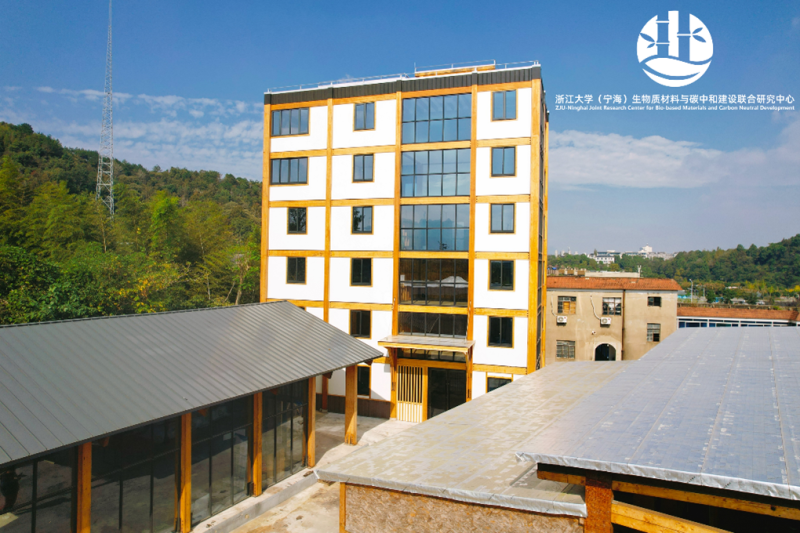
In early 2025, the world’s first bamboo-structured multi-story building—the Ninghai Bamboo Tower—will be inaugurated at the foot of Feifeng Mountain in Ninghai’s Yuelong Subdistrict. According to Professor XIAO Yan, bamboo’s rapid growth cycle and strong fibrous structure give it great strength and flexibility, and China is a major bamboo-producing country with a long history of using bamboo in construction. Bamboo’s eco-friendly nature offers great potential for achieving carbon neutrality. The Ninghai Bamboo Tower demonstrates the innovative use of bio-based materials in architecture and has earned international recognition and many awards at global academic conferences. From ancient bamboo craftsmanship to futuristic bamboo skyscrapers, the commitment to green living and sustainable development remains constant.
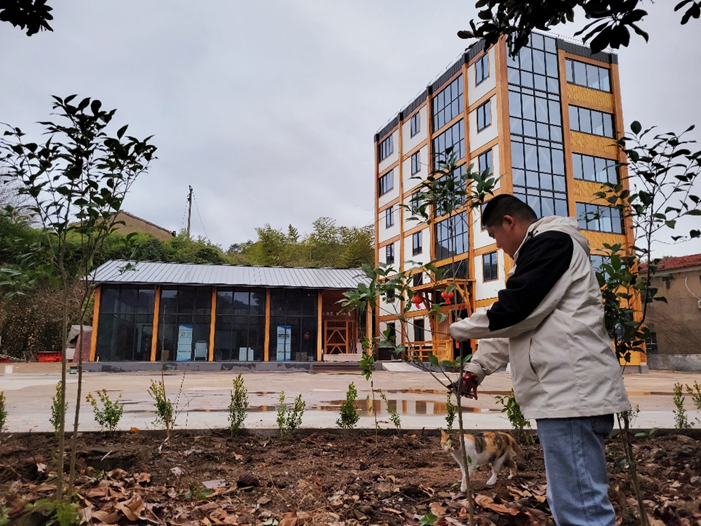
At the end of the field visit, students at the Joint Research Center participated in tree planting and pruning activities, demonstrating how small actions can contribute to major environmental goals.
From the Classroom to Social Responsibility
How do companies begin their journey toward sustainability?
How can we balance economic gains with social welfare?
In the course Corporate Social Responsibility, Assistant Professor Jia Jia Lim from the Zhejiang University International Business School (ZIBS) leads students in exploring the current shift toward sustainable business models. Students propose targeted initiatives, innovative projects, and solutions aligned with the United Nations’ Sustainable Development Goals (SDGs). International student Fang Phei Wern shared, “As students, we learned not only how to structure business organizations but also how to incorporate ESG (Environmental, Social, and Governance) factors in the early stages of entrepreneurship.”
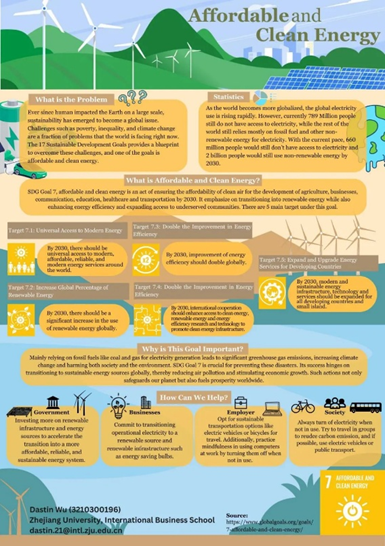
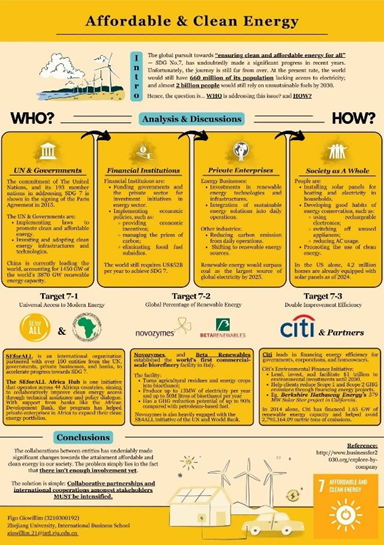
Group Project for the CSR Course
Team Member: Figo Giowillim
From Farmland to a Green Campus
Sustainability at the International Campus goes beyond the classroom. Our campus itself is a living model of sustainable development. We believe that the environment plays a key role in education, and through everyday life on campus, green values become second nature to everyone on campus.
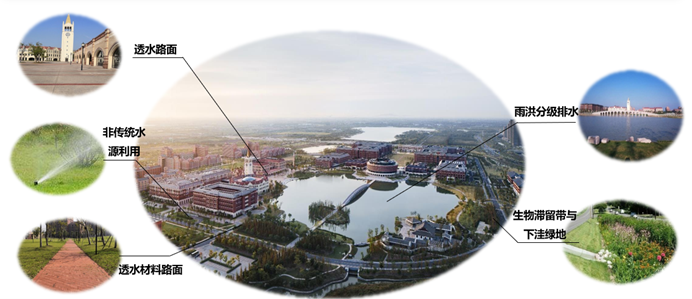
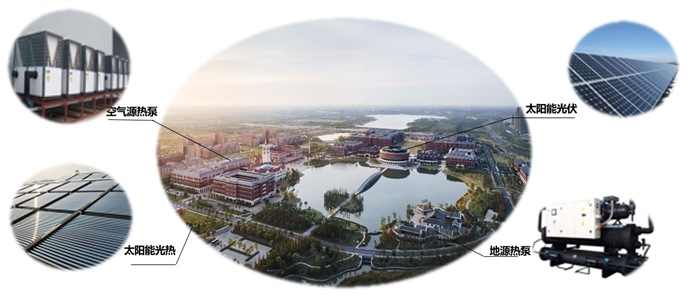
We are committed to using renewable energy. Right from the planning stage, buildings were designed to be equipped with solar thermal systems, as well as air- and ground-source heat pumps, providing 6.69 million kWh of renewable energy annually, accounting for 25% of total energy usage. We are committed to building a “sponge campus.” Rainwater is collected via permeable pavements and stored in a central lake, then filtered and reused for landscaping irrigation—achieving a 15% utilization rate of non-conventional water sources. We are also committed to low-carbon mobility. The core campus area is fully pedestrianized, with access times of 5 minutes for 300 meters and 10 minutes for 600 meters. More than 20 public bike stations span the campus, integrated with 300+ stations across the city. There are also 77 electric vehicle charging spots to support green travel.
We have developed a smart monitoring system that integrates safety, virtual assistance, and energy management, allowing real-time energy use tracking and encouraging energy conservation. We have also established eco-focused student organizations such as the Eco Club and the Green Pioneer Club. These groups provide data for research projects, foster communities of like-minded environmentalists, and spread sustainability awareness.
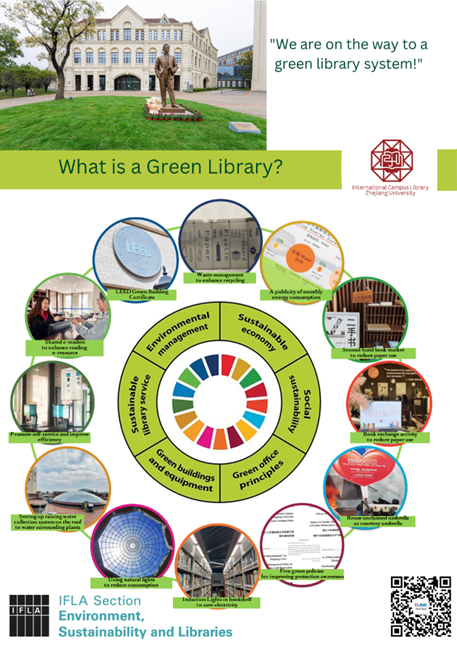
The International Campus is the first in China to receive a Platinum Certification in the Eco-Campus framework. In 2021, it was also certified under the ISO14001:2015 international environmental management system. In 2023, the campus library was recognized by the International Federation of Library Associations (IFLA) as a model Green Library.
From cultural heritage workshops to bamboo towers, from classroom theory to field practice, Zhejiang University’s International Campus continues to explore diverse paths towards harmonious coexistence between humanity and nature. Whether it is cutting down on plastic use, biking instead of driving, turning off lights, conserving water, sorting waste, or donating clothes, every small act contributes to environmental stewardship.
As we celebrate the International Day of Forests, let’s lighten the Earth’s burden and pave the way for a sustainable future.
Article: ZHANG Sijie, HOU Yubing, LI Yinan, LI Songjiao, CHEN Kang
Editing: LI Yinan, LI Songjiao
Editing in charge: ZHANG Yi
Reviewer: YANG Yi
Final Reviewer: QU Haidong